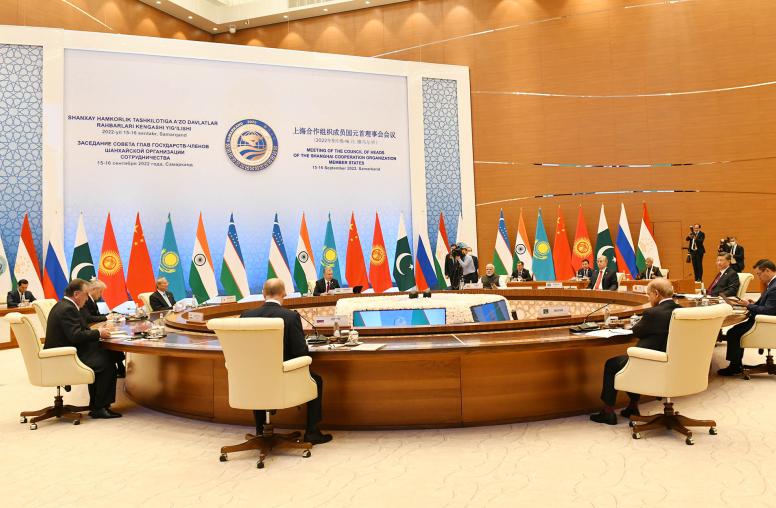With Friends Like These: How Russia’s Invasion of Ukraine Hurts Central Asia
While accepting Russia’s big footprint in their security and economic lives, Central Asian countries have tried to conduct “multi-vector” foreign policies. These countries know that having good (or at least balanced) relations with Russia, China and the United States is important in the long term — and that Central Asian leaders who’ve tried to play the big powers against each other often wind up the loser.

That balancing act became much harder, if not impossible, after last week’s invasion of Ukraine by Russia. And Putin’s revisionist justification for an attack on a post-Soviet neighbor may also portend a fundamental shift in how the region sees Russia going forward. But right now, it is hard to be Russia’s neighbor, much less its friend.
Initial Reactions from Central Asia
The official reactions from Central Asia were mixed, displaying both a distinct lack of support for Russia’s actions as well as a fear of aggravating a Russian leader who has been behaving erratically.
After an informational phone conversation on February 25, Putin’s press service preemptively announced that Uzbek President Shavkat Mirziyoyev “expressed understanding for Russia’s actions.” However, Mirzoyoyev’s press service then clarified that Uzbekistan is taking “a balanced, neutral position.” The Kremlin also announced something similar after a conversation with Kyrgyzstan President Sadyr Japarov, saying that Japarov “expressed support for the decisive actions undertaken by the Russian side.” But the Kyrgyzstan readout only mentioned a discussion of the “current situation in Ukraine.”
On the other end of the spectrum, Kazakhstan reportedly preemptively denied a possible Russian request to deploy troops to Ukraine under the Russia-led Collective Security Treaty Organization (CSTO) — which was used just last month to deploy Russian and other CSTO troops to Kazakhstan during unrest there. Kazakhstan also reportedly refused a request to recognize the breakaway regions of Ukraine.
This information came from the U.S. National Security Council, not from the Kazakhstan side itself, underscoring how impossible a multi-vector foreign policy (or even keeping quiet) is under the current confrontational circumstances.
Reverberating Sanctions
It also seems clear that Russian leaders didn’t quite think through what economic sanctions on Russia would mean for its neighbors. The Russian ruble crashed, and a run on the U.S. dollar in Kyrgyzstan led to exchange offices being unable to meet demand for dollars.
On February 28, the Russian Central Bank banned the export of dollars by foreign citizens from Russia. Tajikistan, Kyrgyzstan and Uzbekistan are heavily reliant on labor remittances sent home by migrant workers in Russia. The pressure on the ruble, banking restrictions on foreigners and — in the long run — the collapse of the labor market in Russia will have an immediate and profound economic impact on Central Asia.
Russian investment projects in the region funded by banks under sanction will have to be cancelled. Exports to Europe through Russia and the sale of oil and gas may also be impacted if sanctions hit the energy sector. Russia and its Eurasian Economic Union may no longer be viable as an economic partner for the region.
Putin’s Justification for Invading Ukraine: A Potential Bad Omen
But perhaps the most chilling problem with living next to Russia now is ideological. Putin’s speech on February 21 justifying the recognition of the breakaway regions of Ukraine as independent countries was largely dismissed in the West as an unhinged ramble by someone who has spent too much time in a COVID-bubble or surrounded by yes-men.
But in justifying a redrawing of the border, Putin played a clear dog whistle for his neighbors. He argued that the very existence of ethnic national administrative units in the Soviet Union was a perversion of the traditional unitary Russian state introduced by the Bolsheviks — and is therefore illegitimate.
In doing this, Putin is echoing the Pan-Slavist revisionist ideology of Alexander Solzhenitsyn. This is a fundamental revision of the mutual recognition of successor states upon the collapse of the Soviet Union, the meaning of which cannot be lost on the rest of Russia’s neighbors, especially Kazakhstan. Putin’s past dismissal of the legitimacy of Kazakhstan statehood takes on a new menace after what has happened in Ukraine. Just before the Ukraine crisis, during the recent January 2022 unrest in Kazakhstan, right-wing Russian politicians called for Russian annexation of the northern regions of Kazakhstan, where Russians are the traditional ethnic majority. Small-scale popular protests in support of Ukraine in Kazakhstan and Kyrgyzstan give some indication of how people feel on a popular level about Russia’s actions.
Before this crisis, Central Asian states had been absorbing the implications of the U.S. and NATO withdrawal from Afghanistan and the return of the Taliban next door — which was already a major shift in Central Asia’s security environment.
Without a doubt, the level of animosity and confrontation between Russia and the West after the invasion of Ukraine will make any collective efforts to stabilize Afghanistan that much harder. But the huge shift in Russia’s foreign policy represented by invasion of Ukraine has kicked another leg out from under Central Asian states’ multi-vector foreign policy.
In six short months, the West decided to give up on a major security commitment in the region and Russia’s commitment to its neighbors has come into question. The countries of Central Asia have been engaging on the Afghanistan question with growing self-confidence. The situation in Ukraine may further push Central Asian states into proactive or even collective action. Initiatives like Kazakhstan’s offer to serve as a mediator between Russia and Ukraine may signal a new assertiveness in what is clearly a very difficult situation for the countries of the region.



